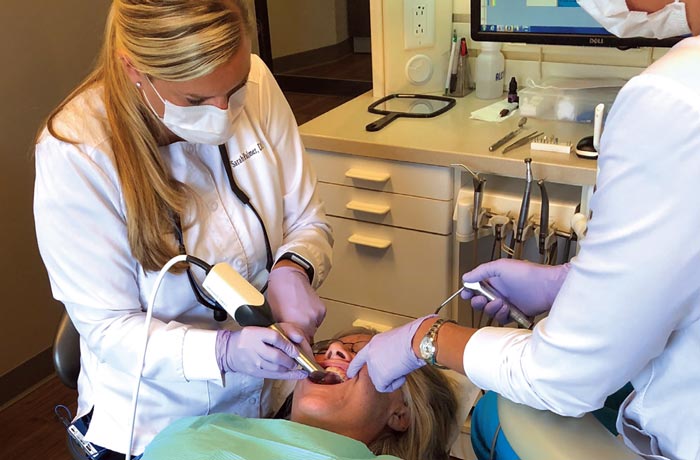Your Guide to Selecting the Right Dentist Eugene OR for High Quality Solution
Your Guide to Selecting the Right Dentist Eugene OR for High Quality Solution
Blog Article
Learn Regarding Constant Oral Concerns Your Dental Professional Can Resolve
Comprehending regular dental concerns is crucial for keeping ideal oral health. Concerns such as tooth cavities, periodontal condition, tooth level of sensitivity, negative breath, and tooth decay are usual yet usually forgotten till they end up being extreme. Normal dental check outs and personalized care plans can attend to these problems successfully, making certain a much healthier and brighter smile.
Dental Caries
Dental caries, likewise referred to as dental decays, are a prevalent oral health problem triggered by the demineralization of tooth enamel because of acid manufacturing from microbial plaque. This process begins when microorganisms in the mouth metabolize sugars and starches from food, creating acids that deteriorate the enamel. Otherwise dealt with promptly, this disintegration can permeate much deeper into the tooth, influencing the dentin and eventually the pulp, possibly bring about severe pain and infection.
The beginning of dental caries formation frequently present as white places on the tooth surface area, indicating preliminary demineralization. As the procedure progresses, these areas can turn into brown or black lesions, symbolizing more considerable degeneration. Normal dental check-ups are vital for early detection, as tooth cavities in their inceptive stages can be treated with remineralization techniques, such as fluoride treatments.
Once a tooth cavity has developed, corrective intervention is required. Dental professionals commonly eliminate the decayed section of the tooth and fill up the tooth cavity with products such as composite material, amalgam, or ceramic. In much more extreme cases, a crown or root canal therapy might be called for. Safety nets, consisting of great oral hygiene practices and dietary alterations, play a crucial duty in minimizing the risk of cavities.
Gum Tissue Illness
While cavities stand for a substantial concern for oral wellness, one more important problem that requires attention is periodontal disease. Known as gum illness, gum condition is an inflammatory condition affecting the tissues bordering and sustaining the teeth. It is mostly triggered by the accumulation of plaque-- a sticky movie of microorganisms that bases on teeth.
Gum tissue disease proceeds through phases, starting with gingivitis, defined by soreness, swelling, and bleeding gum tissues (dentist eugene or). If left neglected, gingivitis can intensify to periodontitis, where the inner layer of the gum and bone pull away from the teeth, forming pockets that end up being contaminated. Over time, the toxins generated by the microorganisms break down the bone and connective cells that hold teeth in area, possibly resulting in missing teeth
Early discovery and treatment are important. Professional oral cleansings and improved oral hygiene methods, such as cleaning twice daily and flossing, can take care of gingivitis. For advanced stages, therapies might include scaling and root planing, antibiotics, or perhaps medical interventions.
Routine oral exams play a pivotal function in managing and avoiding gum tissue illness. Dental experts can determine early indicators and suggest ideal interventions, making certain the upkeep of healthy and balanced gums and total oral health.
Tooth Level Of Sensitivity
Tooth sensitivity influences numerous people worldwide, providing a common yet often distressing dental concern. This condition emerges when the enamel, the outermost safety layer of the teeth, is compromised, revealing the underlying dentin. The dentin includes tiny tubules that lead straight to the dental pulp, where nerves live. When subjected to stimulations such as warm, cold, wonderful, or acidic materials, these nerves are triggered, creating sharp discomfort or discomfort.
Numerous elements contribute to enamel disintegration and succeeding tooth level of sensitivity, including aggressive cleaning, acidic foods and beverages, gum recession, and bruxism (teeth grinding) Additionally, dental treatments such as teeth bleaching can temporarily increase sensitivity.
Negative Breath
Another widespread oral issue that influences people' day-to-day lives is poor breath, medically termed halitosis. Halitosis frequently originates from poor dental hygiene, which allows food bits to remain in the mouth, promoting microbial development.

Dental professionals play a critical role in diagnosing and treating halitosis. They can identify the source through a thorough evaluation and give tailored recommendations and treatment strategies. Suggestions may involve boosting oral health methods, such as routine cleaning and flossing, utilizing antibacterial mouth washes, staying moisturized, and attending to any oral problems. image source In many cases, a reference to a specialist may be essential to take on underlying health troubles contributing to foul breath. Reliable management of halitosis not just improves oral wellness yet likewise dramatically improves lifestyle.
Tooth Degeneration

Preventing tooth degeneration includes a mix of excellent dental health techniques and routine dental examinations. Cleaning teeth at the very least twice daily with fluoride tooth paste, flossing to get rid of plaque in between teeth, and limiting the intake of sweet foods and drinks are necessary safety nets. Fluoride treatments, dental sealants, and specialist cleanings offered by a dental expert can additionally play a considerable duty in fortifying enamel and stopping degeneration.
Dental professionals can get rid of decayed cells and bring back the tooth with dental fillings made from products such as composite resin, amalgam, or porcelain. By dealing with tooth decay without delay, dentists help maintain dental framework and function, making certain long-lasting dental health.
Final Thought
Attending to typical dental issues such as dental caries, gum tissue condition, tooth sensitivity, halitosis, and tooth degeneration is essential for keeping optimal oral wellness and total health. Dental professionals possess the competence to detect and treat these issues efficiently, ensuring tailored treatment for each patient. Normal oral exams and safety nets are crucial in identifying and handling these concerns early, promoting a healthier and more certain smile over a life time.

Tooth decay, additionally recognized as dental caries, happens when the enamel, the outer layer of the tooth, is eroded by acids generated by germs in the mouth. Brushing teeth at the very least two times daily with fluoride toothpaste, flossing to eliminate plaque in between teeth, and limiting the consumption of sugary foods and beverages are crucial preventative measures.Attending to common dental concerns such as cavities, gum illness, tooth sensitivity, poor breath, and tooth decay is important for preserving ideal oral health and general health.
Report this page